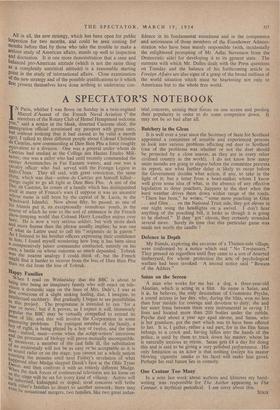A SPECTATOR'S NOTEBOOK
IN Paris, whither I was flown on Sunday in a twin-engined Marcel d'Assaut of the French Naval Aviation (" the members of the Rotary Club of Hemel Hempstead welcome 1011," said a notice in the bleak, deserted Customs shed; the Immigration official scrutinised my passport with great care, but without noticing that it had ceased to be valid a month ago), I talked to three different people about Colonel Christian de Castries, now commanding at Dien Bien Phu a force roughly equivalent to a division. One was a general under whom de Castries had studied at the College des Hautes Etudes Mili- takes; one was a sailor who had until recently commanded the carrier Arromanches in Far Eastern waters; and. one was a cavalry officer who had served with the Foreign Legion in Ingo-China. They all said, with great conviction, the same thing, which was that—unless de Castries got himself killed— ,things ought to go all right at Dien Bien Phu. A son of the itself de Castries, he comes of a family which has distinguished dself in many of France's wars (I suppose it was an ancestor whose name is still born by the capital of St. Lucia, in the Windward Islands). Now about fifty, he passed, as one of his friends put it, an exceptionally tumultous youth, in the course of which he rose to the sort of eminence in the French showjumping world that Colonel Harry Lewellyn enjoys over here. He is now a very serious soldier, but with more dash and more finesse than the phrase usually implies; he was one of what de Lattre used to call his " seigneurs de la guerre." As I listened to his brother officers expressing their confidence in, him, I found myself, wondering how long it has been since a comparatively junior commander conducted, entirely on his 43w11, a battle on whose outcome so much depended. Tobruk Was the nearest analogy I could- think of; but the French Tight find it harder to recover from the loss of Dien Bien Phu than we did from the loss of Tobruk.


































 Previous page
Previous page